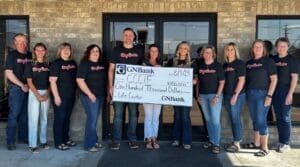By Trish Svoboda
The Land Treaties Project at Kansas State University is receiving support from the National Endowment for the Humanities to develop educational resources that narrate the history of land acquisition in Kansas and the displacement of the Kaw Nation.
A grant of $150,000 from the Humanities Initiatives will assist the Chapman Center for Rural Studies, part of K-State’s College of Arts and Sciences, and its partners in creating oral histories, annotated historical documents, educational videos, curricula, and other materials. These resources will show how Kansas, and specifically Kansas State University, the first operational land grant institution in the U.S., came to own the land of the Kaánze níkashinga, the ancestors of today’s Kanza people, also known as the Kaw Nation.
This project, which emphasizes active learning, connectivity, and community, aligns with the Next-Gen K-State strategic plan. It is anticipated that the educational resources developed through this project will benefit thousands of students during the grant’s duration, with initial emphasis on K-State and Johnson County Community College. The public will have free access to these resources and documentaries, which are expected to be widely valued across the region.
The project is spearheaded by Lisa Tatonetti, an English professor and the Coffman Chair for University Distinguished Teaching Scholars; Tai Edwards, who is the director of the Kansas Studies Institute; Mary Kohn, the director of the Chapman Center; and Alex Red Corn, an associate professor of educational leadership, the executive director of the Kansas Association for Native American Education, and the co-chair of K-State’s Indigenous Faculty and Staff Alliance. The project is a collaborative effort involving members of the Kaw Nation, such as James Pepper Henry, the Vice Chair of the Kaw Nation, and C. Huffman, a Kaw Nation citizen and descendant of the Potawatomi. Additional contributors include the Kansas Studies Institute, Johnson County Community College, educators from regional high schools, and students from all over the state. You can find more information about the Kansas Land Treaties Project at kansastreaties.com.













